Camping for Beginners
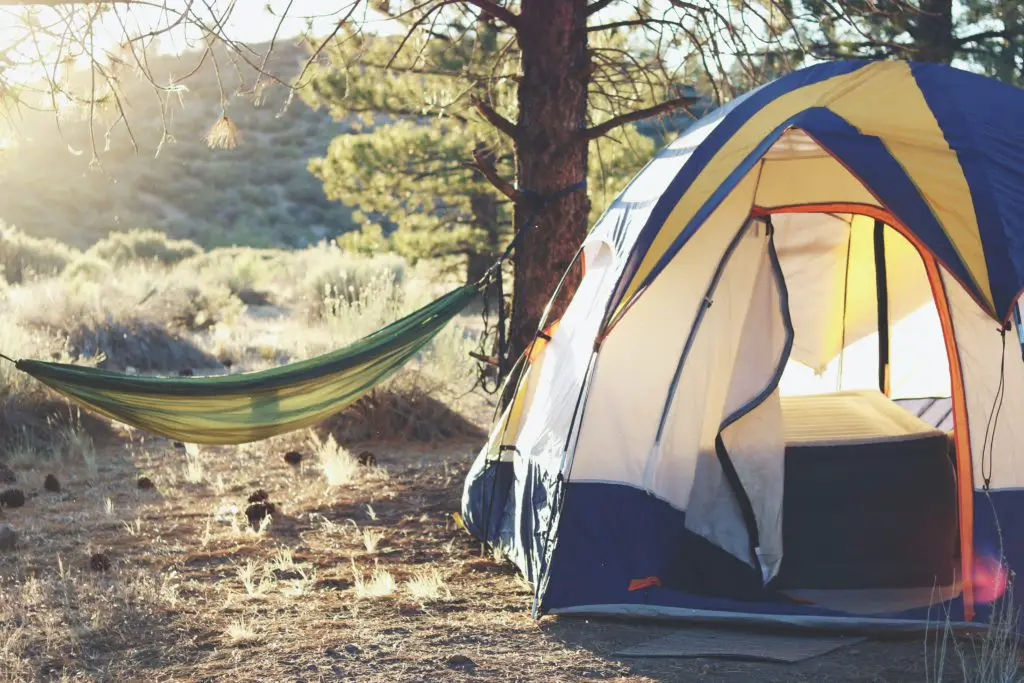
Camping is one of the best ways to leave the stress of everyday life behind and enjoy the beauty of the outdoors. The fresh air, starry skies, and campfire all allow for unique experiences that help refill our tanks. If you’re jonesing for some time outdoors, in this guide to camping for beginners, we’ve put together some tips to help you on your initial trips. Following these steps will ensure successful camping for beginners.
Initial Tips
Start with Car Camping
Car Camping doesn’t mean sleeping in your car (though this is an option). Car Camping simply camping somewhere you can drive to and unpack all of your gear. Car camping allows you to pack anything you might want to bring along without worrying about the size and weight restrictions of what you bring.
Keep it Simple
Don’t overthink your first few camping trips. You don’t need to find nearby hikes to fill your day or catch your own fish for dinner. Ensure a successful and pleasant entrance into camping by focusing on the essentials and leaving plenty of time to simply enjoy the experience.
Keep it Short
Don’t be overly ambitious on your first few trips. An overnight camping trip allows you to bring less, requires less planning, and has less to go wrong. Get the basics down for a single night before pushing things on a multi-day trip that requires a lot more preparation and planning.
Don’t Stress About Not Having All the Right Gear
Don’t be intimidated by all of the specialty camping gear available on the market. You don’t need to spend hundreds of dollars to have a fun camping trip. You can bring a lot of necessary gear from your home to get you through your first few trips. When you decide to camp more frequently, then you can invest in gear.
Planning Your First Trip
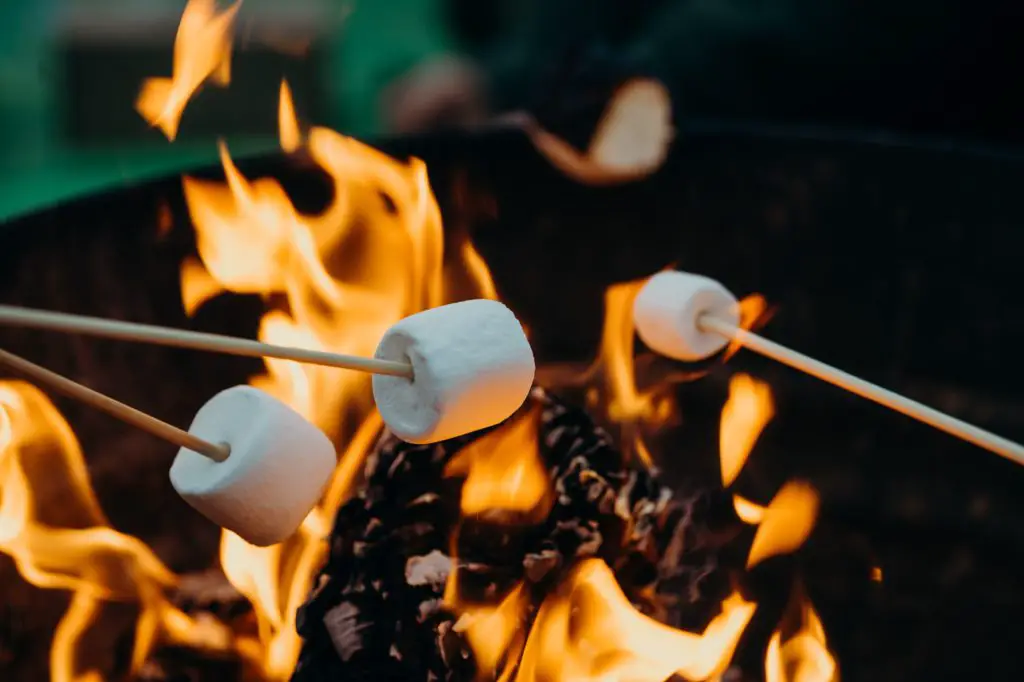
The key to successful camping for beginners is proper planning. Once you’re comfortable sleeping outdoors, planning is less essential, but when just getting started with camping, it’s important to think through your trip beforehand.
Where to camp
Modern campgrounds are typically a mix of rustic and comfortable. Most campgrounds have toilets, potable water, and garbage facilities on site. Campsites typically have a parking spot (or 2), a cleared and level area for your tent, and a picnic table. Some campsites have a firepit ring.
The best campsites to choose when beginning camping are ones that are reservable online. Reserving your spot ahead of time will ensure that you have a site when you arrive. The website Recreation.gov has a searchable list of campgrounds in National Forests across the US and is a great spot to start your search. Campendium is another campsite resource we highly recommend. While primarily focused on RV campers, Campendium has campground reviews, cell service information, and camper-taken photos that can also help you find the perfect tent campsite. Popular campsites book quickly, so plan ahead to reserve your dates.
Most campgrounds have a number of campsites that aren’t reservable. These are first-come-first-serve campsites that can be claimed when you arrive. If you head out without a reservation, make sure to plan to be there early to have the best chance to get one of these spots. Don’t plan on arriving at 5 pm on a Friday and being able to find a spot. Your best bet is to plan on arriving just before the “check-in” time to grab an open spot before the masses arrive.
Watch the Weather
Knowing what Mother Nature may throw at you while camping is important. Not having warm enough clothes during a chilly evening or having your single pair of shoes soaked by rain can ruin a camping trip quickly. Check the weather at your camping location when packing to make sure you have the right clothing. If rain is in the forecast, don’t necessarily cancel your trip – some of our most memorable outdoor experiences have been accompanied by the soothing sound of rain on our tent’s roof. On the other hand, if the forecasted low temperatures are cooler than expected or if extended rain is in the forecast, it may be a good idea to reschedule.
Temperatures also will have an effect on your outdoor activities. If it’s hot during the daytime, you’ll want to make sure you have plenty of shade – either by trees at your campsite or provided by the gear you bring. If rain is in the forecast, make sure to plan indoor activities. Books and board games are great things to have on hand for rainy days spent inside your tent. When camping, it’s important to allow for weather to be a part of the experience. A rainy day is a great excuse the get that long nap you’ve been dreaming of taking or working through that book you wish you had more time to read.
Whatever the weather is, be sure to plan and pack accordingly. Bring an extra change of clothes in case you get wet. Pack layers of clothing. Remember that you can always remove layers as temperatures warm. For your first few camping trips, steer clear of nighttime temperatures lower than 40 degrees. You’ll most likely need specialized gear or a heat source to sleep comfortably in temperatures lower than 40.
Plan Properly
Beyond watching the weather, it’s a good idea to think through your trip to make sure you have everything you need. If you plan on exploring the nearby area and plan to leave your campsite unattended, do you have a plan to secure your valuables? If you plan on fishing in a nearby creek, don’t forget to pack your rod, reel, bait. Do you have a valid fishing license? Looking forward to having s’mores around the campfire at night, don’t forget to bring everything you’ll need to start the fire and the ingredients for the s’mores. Even the most experienced campers forget things from time to time, but walking through your trip outdoors will help you make decisions before you head out.
What to Wear
When packing for your first camping trip, don’t over-pack – one of the joys of camping is the simplicity of it, and lugging around extra gear isn’t fun. Bring what you’ll need, with backups of the essentials in case of rain. Like your mom suggested when spending the night at a friend’s house when you were a kid, an extra pair of socks and underwear is always a good idea. Pack warmer clothing that you think you’ll need. It’s easy to add and remove layers of clothing as the temperature changes, but it’s tough to do if your layers are at home. In the outdoors, evenings and early mornings can be chilly – it’s part of the charm of camping – so plan accordingly. If rain is in the forecast, a light rain jacket will do wonders to keep you dry.
Shoes
You don’t have to go out and buy hiking boots to go camping. Honestly, for many hikes, you don’t need hiking boots. In most cases, simple tennis shoes will do fine for both camping and hiking. Since you’ll be treading in natural areas, open-toed shoes aren’t ideal. You can bring a pair of sandals if that’s your thing, but you’ll discover quickly that your feet will be filthy. In case your shoes get wet, it’s a good idea to have a second dry pair t put on. It’s not necessary, but if you have the room, bring them along.
Toiletries
If you’re camping for one night, toiletries will be minimal, but there are a few items you shouldn’t be without when camping for the first time. Make sure to bring your medications and personal hygiene items. You won’t need to worry about shower items as you most likely won’t have a shower at your campsite – you don’t need a shower anyway for one night away. Bring hand soap and a bottle of hand sanitizer is always good to have on hand in a pinch. A first-aid kit is helpful to have in case of injury, but you can also just bring a few bandaids and medication from home. I always bring along some sort of pain reliever when I camp and recommend bringing a small bottle to fight off a headache, stiff back, or sore muscles. Don’t forget sunscreen and bug spray – you may not need them, but you’ll be glad you packed them in case you do. A towel to dry your hands and a roll of toilet paper in case the campsite bathroom runs out are also good ideas.
Meals while Camping
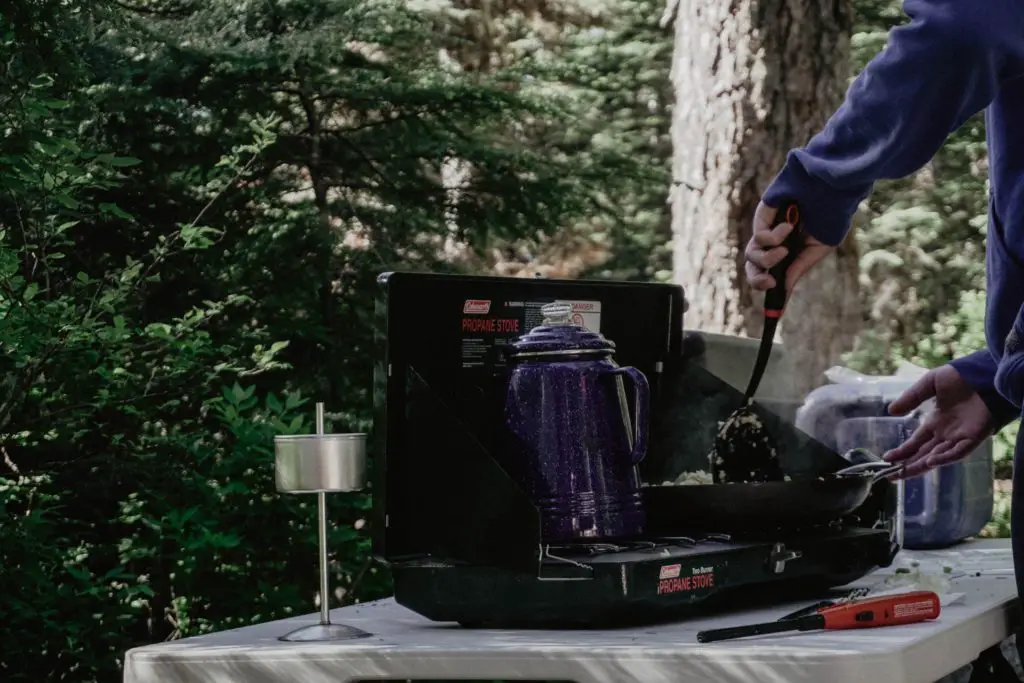
With a little advanced preparation, camping meals can be a highlight of the experience. Regardless of how you approach cooking while camping, it’s important to plan out your meals before you leave for the trip. Meals with simple ingredients and simple preparation are best, but that doesn’t mean your camping meals have to be bland or boring.
I’d caution against being overly ambitious on your meal planning for your first few trips. Scratch plans to cook over an open fire. Weather conditions and fire restrictions may leave you hungry if you don’t have another way to cook your food. It’s better to plan meals that can be cooked over a small camp stove. Plan meals that will be easy to cook and pull off while outdoors with minimal effort. Hamburgers, bratwurst, or even chicken breasts marinated at home are great lunch or dinner options.
Breakfast is typically the meal my family looks forward to while camping. There’s nothing better than some eggs, country potatoes, and bacon – all cooked in the same pan after a night of deep sleep under the stars. Pancakes are another campground favorite. A “just-add-water” pancake mix makes the process easy with minimal utensils needed.
Lunch is the easiest meal to keep it super simple. Sandwiches are a great option here to keep the stress low, but any dinner meal can also be subbed in for lunch.
Basic is best in the spice & seasoning department. Salt and pepper are must-brings, but packing your favorite all-around seasoning is a good idea as well to give your meals an extra kick of flavor.
Don’t forget the coffee or tea. If you have a stovetop kettle and have room in the car, bring it along. If not, you can heat water in a pot on the stove to use for your coffee or tea. When camping, I make my coffee using a stovetop espresso maker (moka pot), but a percolator will do the trick as well.
Whether you grab dinner on the road on the way to your campground or cook a 5-course dinner at your campsite, thinking through each meal ahead of time will help you shop and pack appropriately. And don’t forget the details to make sure you bring everything you need along on the trip.
Essential Gear for Camping
Campsites are built to help campers get into nature. They are primitive with only basic facilities (water, bathrooms, trashcans), so keep that in mind when packing your gear. Camping is all about getting away from the complexity and stress of everyday life in the city, so embrace the environment you’re headed into. Pack what you need, and leave behind what you don’t.
A typical campsite will have an area for your tent, a table, a parking lot, and (possibly) a campfire ring. Bathrooms and water sources will be a short walk away. The benefit of car camping is that you can bring as much gear as you can fit in your vehicle – and can leave it in your car if you don’t need it.
Camping gear can be expensive. Don’t be intimidated by the high cost of some camping gear or discouraged by the wide variety of specialized gear that you don’t have. Ask friends, family, or a neighbor to borrow the essentials before investing in the gear yourself. Whether you purchase the essentials or borrow them, here is a list of the gear you’ll need for a successful camping trip.
- Tent – Your tent will keep you out of the rain and away from the bugs while you sleep. Tents are rated by how many people they will sleep, but it’s wise to size up for extra room if possible. 3 or 4-person tents will be perfect for a couple and 6 or 8-person tents will sleep a family of 4 with room to breathe. This 3-person Colemen tent is highly rated and is easy to put up if you choose to invest in a tent rather than borrow one. Whether you buy or borrow a tent, it’s a good idea to set it up in your backyard before heading to the mountains. This “practice” will make setup at your campsite a breeze and save you stress on your camping trip.
- Sleeping Bag – Sleeping bags typically have temperature ratings – the outside temperatures they are rated to keep you warm in. For most beginning campers venturing out in warm weather, a 3-season bag will be more than warm enough. Rectangular sleeping bags (not mummy bags) are the better option for beginners as they’ll give you room to move while you sleep. This Oaskys 3-season Sleeping Bag comes in a variety of colors and is a great value pickup for beginning campers. If you’re camping on a budget, you can also bring bedding from home to use while camping. Fleece blankets or duvet comforters work great and make it feel like you’re sleeping in your own bed. Just don’t bring anything that you can’t handle getting dirty – it will get dirty.
- Sleeping pad (or air mattress) – Your sleeping bag will keep you warm, but it won’t do much to protect you from the hard ground you’re not used to sleeping on. For most of us, sleeping on a hard surface is guaranteed to equal a sore back in the morning. A sleeping pad will help provide some cushion between you and the ground. It won’t be near as comfortable as your mattress at home, but it will be much better than sleeping on the ground – trust me. Another option is to pack an air mattress – especially for those that already have one laying around for house guests. Air mattresses will keep you higher off the ground than a typical sleeping mat, but will take more effort to blow up. Another issue people often have when camping with air mattresses is air loss during the night. Temperatures fluctuations and small leaks can find you waking up to a leaky air mattress. In my opinion, if you trust your air mattress, it’s worth the risk.
- Light – Campsites can get dark at night. The benefit of the darkness is the ability to see stars you couldn’t imagine in the city. The challenge is that if you don’t pack adequate light sources, you can be left struggling to see much of anything. Flashlights are the easiest to bring as most of us have a few laying around the house. They provide directional light and when shined at the top of the tent, can illuminate a great deal of space. For lighting to light up larger areas, a lantern is a great piece of gear to have. While kerosene lanterns were the light source of previous generations of campers, LED lanterns are the way to go now. This LE LED rechargeable lantern with a 4400mAh power bank provides light for your campsite and will charge your phone as well.
- Camp Stove – The classic 2-burner propane camping stoves are the way to go for beginning campers. The simple devices have two burners that can handle all but your largest kitchen pots and pans and use small 1lb propane tanks that are easily found in stores. The tops of these stoves fold up to form a windscreen to help prevent wind from getting in the way of your cooking. Most people who camp semi0seriously have some version of this classic camp stove and it should be easy to find someone to loan your theirs. You may also be able to find a used one at a discount online. I wouldn’t have too much anxiety about buying one of these used – they typically last a long time.
- Cooking Gear – You can bring your pots, pans, and utensils from home on your first few camping trips – so don’t feel the need to go out and buy these new for your camping trip. If you have nice stuff in your kitchen you don’t want to risk damaging while camping, you can often build a “camping” set of pots, pans, and utensils at your nearby thrift store for next to nothing. If you go this route, it’s a good idea to keep all of your camping kitchen gear in a plastic tub for easy storage and quick transport. If cooking is your jam and you want to invest in a good pan and pot for camping, consider picking up this cast iron combo set. Don’t forget to bring along biodegradable dish soap (we love Dr. Bronner’s Pure Castile Soap – an 18-in-1 soap) and a scrubbing pad to do dishes after your meal. While campgrounds typically have water available, most don’t allow washing dishes at the water source. So bringing a plastic tub to serve as a wash basin is a great idea.
- Cooler – You probably already have a cooler stored somewhere. On a short camping trip, your cooler, filled with ice, will serve as your refrigerator – keeping your food (and beer) cold. If you don’t have a cooler, borrowing one from a friend or neighbor should be pretty painless.
- Camp Chairs – Folding camping chairs aren’t a necessity as most campsites have a table already, but having a few on hand will allow you to sit and relax wherever you want at your site. You’ll especially love having them to sit around the campfire on a chilly evening. Of all the items on this list, investing in a few inexpensive camp chairs will give you the most use beyond camping. They’re great for backyard parties, kids’ sporting events, or just about anywhere you want to sit for a while.
- Cups and Water Bottles – While disposable cups and plastic water bottles seem convenient for a camping trip, the extra waste they leave behind isn’t worth the convenience. Bring along some reusable drink tumblers and metal water bottles instead. You can find some great options at Outward Goods including our insulated wine tumbler, sherpa tumbler, and our 22oz vacuum insulated bottle. These all make great items to have when camping and can also be used around the home while keeping your drinks at the desired temperature – in style!
- Water Container – At your campground, water will usually be found a short walk from your campsite. It’s great to have a larger water container to fill up once at the start of your trip and then to use to dispense water at your site. We typically keep our water container on the campsite table at all times for easy access to water for drinking, cooking, and cleaning.
Bonus Tips
Don’t forget the pillows. The most forgotten item when my family goes camping are pillows. Having a pillow while camping can make all the difference in the world – don’t forget yours.
Google camping recipes. If you want to put some extra culinary effort into your camping experience, you’ll find some pretty creative camping meal recipes online. These 27 Easy Camping Meals to Make Camp Cooking a Breeze from Fresh off the Grid is a good place to start.
Bring along a power bank. While the point of camping is to get away from technology, it’s wise to keep your phone close by and charged in case of emergencies. Having a power bank on your trip will ensure you can keep your phone charged the whole time.
A hammock is a wonderful thing. Stretched between two trees at your campsite – laying in a hammock is the perfect way to read a book or to take an afternoon nap. If you decide to pick one up, try to find one with tree straps included, like this one.
Get Out There and Camp
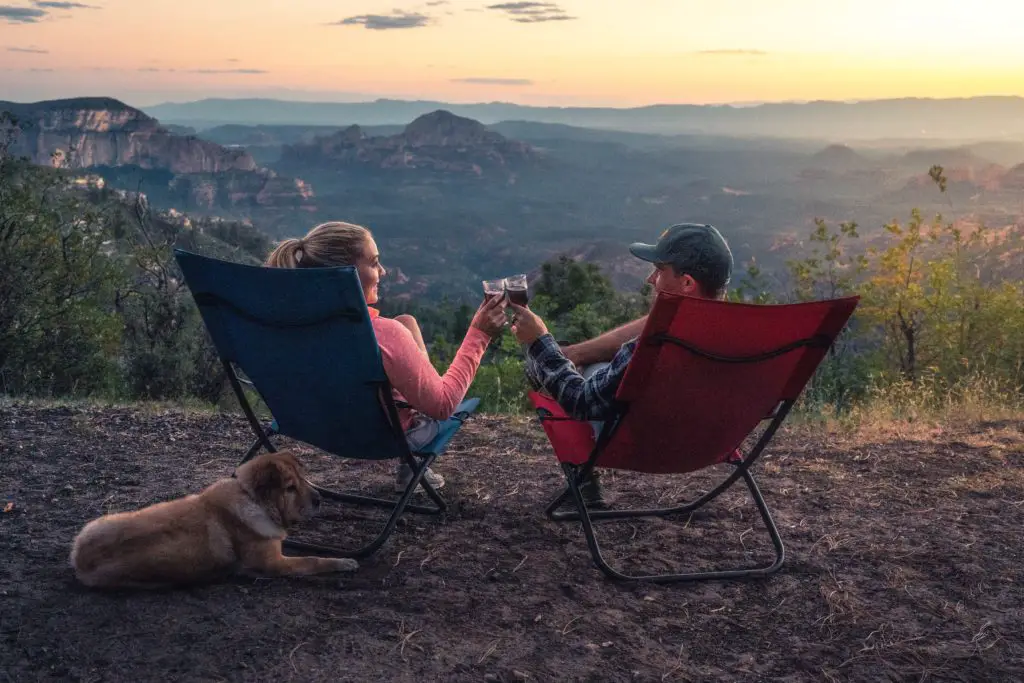
Camping is an awesome outdoor activity. It can help to reduce stress, improve mental health and connect us more deeply with nature. If you haven’t been camping before, don’t be intimidated or discouraged by your lack of experience. Following the camping for beginners tips in this article will get you well on your way toward a successful outdoor experience. With proper planning and preparation, camping can be done easily and inexpensively. So what are you waiting for? Get out there and give it a shot. You may find yourself falling in love with the fresh air, quiet spaces, and freedom from everyday life.
Now that you are a camping pro, check out our Guide to Showering When Camping.
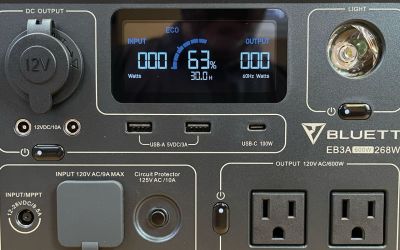
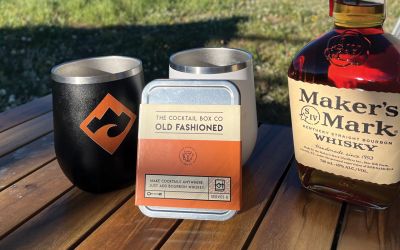
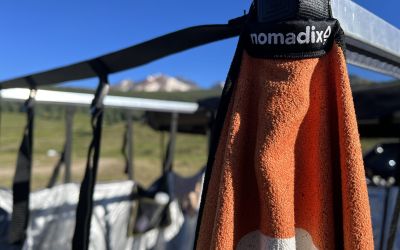
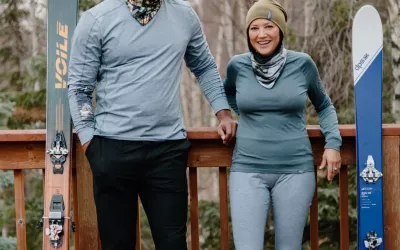
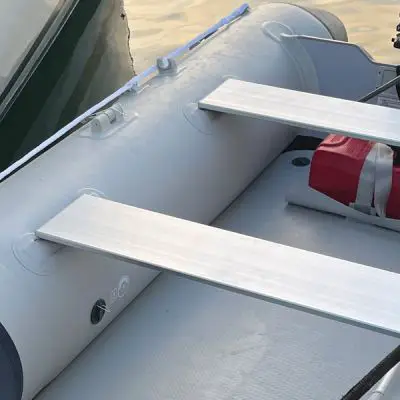
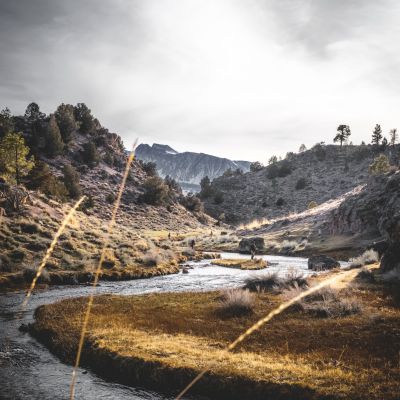

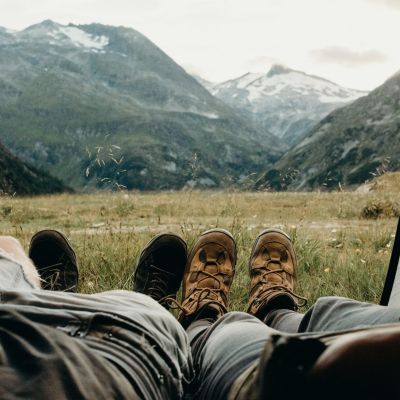
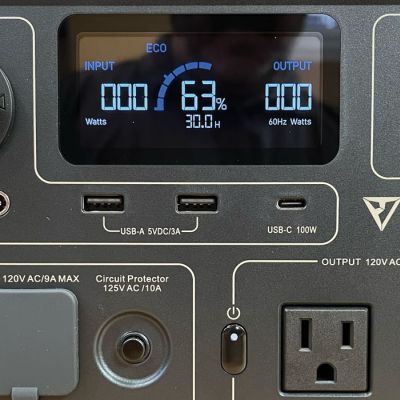

Hey there, Outward Spaces! I must say it’s an excellent read. As someone who is new to camping, your tips have been a real eye-opener, and I appreciate the valuable information you’ve provided.
One thing that stood out to me was your emphasis on preparation. It’s crucial to have a checklist of essential items to pack, especially if you’re going camping for the first time. I never really thought about it, but it makes perfect sense to bring a first-aid kit, extra batteries, and a portable charger, just to name a few. Your list of must-haves has given me a good starting point, and I’m grateful for the insight.
Additionally, I appreciated your suggestion to start small and work your way up to more extended camping trips. I think it’s wise to start with a weekend camping trip before committing to a more extended excursion. That way, you can test the waters and see if you enjoy it before investing in more gear and planning a longer trip.
Overall, your article was informative and engaging, and I’ll definitely be referring to it in the future. Thanks for sharing your knowledge and expertise with us!
Your comment is awaiting moderation.
Mistakenly Identified as Deceased by TransUnion: An Increasing Concern
Errors in credit reporting can have very detrimental consequences. One of the most frightening mistakes people may encounter is having their credit bureaus, such as **TransUnion**, mistakenly report them as dead. This grave issue can have a substantial negative impact on everything from career chances to credit applications. It is imperative in such situations to know how to dispute a background check and to navigate the difficulties of credit report disputes.
### Understanding the Problem
Imagine learning you are erroneously listed as deceased on your credit record. This is not an rare situation, however. Persons in this situation must move swiftly to rectify it. One important first step can be to contact a background check lawyer or a deceased on credit report lawyer. Experts in background check errors, these professionals can provide the assistance you need to amend your credit report.
How to Contest a Background Check
Understanding how to dispute a background check becomes critical when dealing with such a major mistake. Reach out to the credit bureau that made the error first. You must confirm your identification and demonstrate you are still living. Employing marked as deceased on credit report lawyers can expedite this sometimes daunting process. These specialists can guarantee your case is handled efficiently and guide you through the complications of a background check dispute.
The Role of Attorneys in Resolving Credit Report Errors
Particularly valuable is engaging with my credit report says I’m deceased lawyers. These lawyers concentrate in detecting and fixing severe mistakes on credit reports. They can act on behalf of you in negotiations with credit bureaus and other relevant parties to make sure your issue is addressed and settled promptly. Considering their expertise in background check disputes, they are knowledgeable with the legal options open to correct such errors and can give effective counsel if needed.
Preventing Future Errors
Once the error is corrected, steps must be taken to prevent it from happening again. Frequently inspecting for errors in your credit report can help spot problems early on. Preventive credit monitoring and being aware of how to dispute a background check can help guard against potential mistakes. Should inconsistencies surface, responding swiftly to **dispute a background check** can lessen the effect of these errors on your individual and economic life.
In conclusion, it can be upsetting when TransUnion reports you as deceased. However, with the right method and support from knowledgeable professionals like a background check lawyer, individuals can manage the process of challenging these errors and regaining their creditworthiness.
Learn more: https://bucceri-pincus.com/kyle-buc/